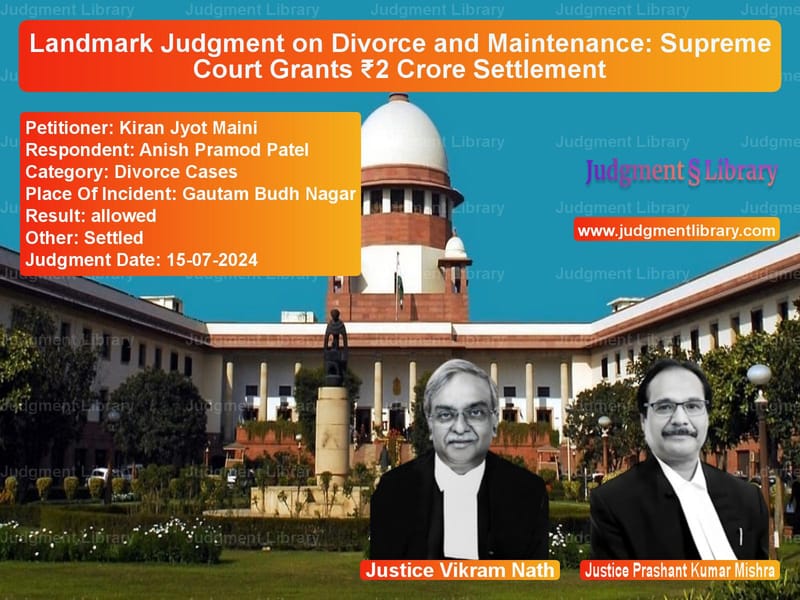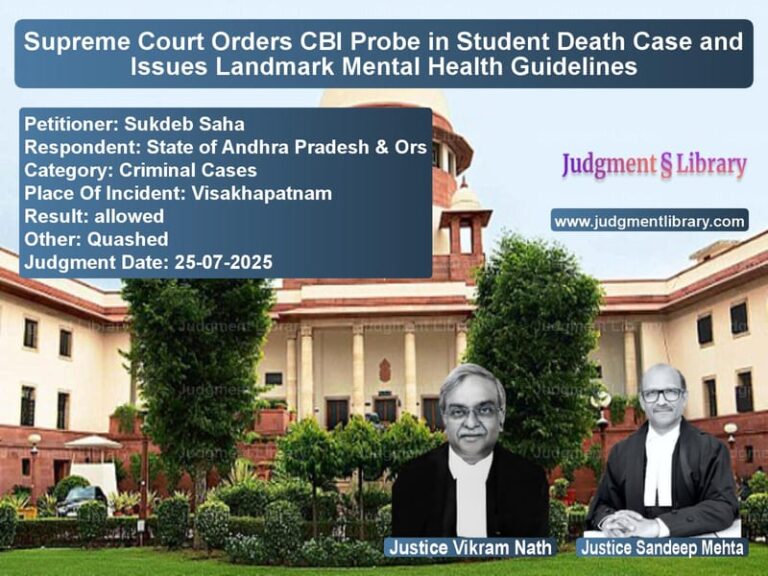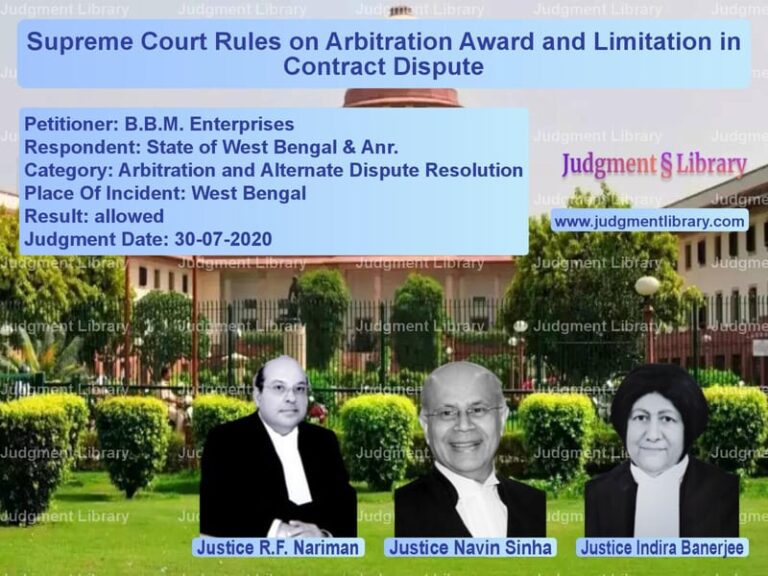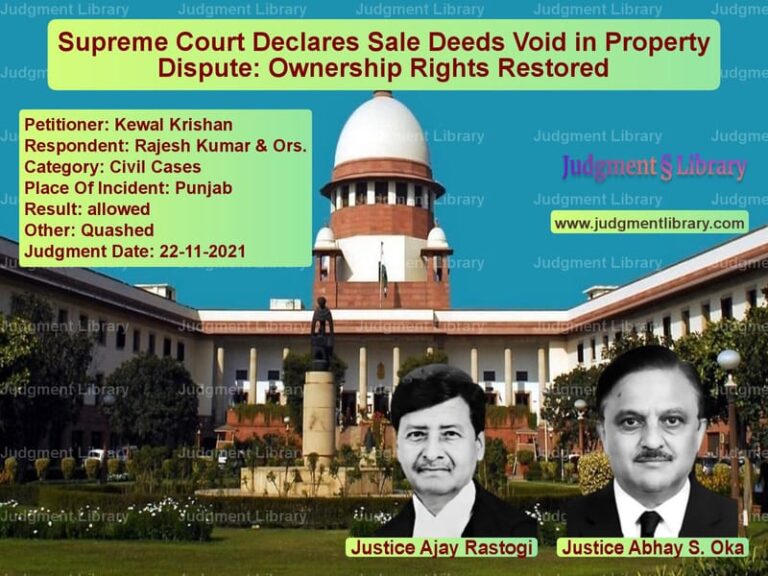Landmark Judgment on Divorce and Maintenance: Supreme Court Grants ₹2 Crore Settlement
The case of Kiran Jyot Maini vs. Anish Pramod Patel marks a significant ruling in the domain of matrimonial disputes, domestic violence, and financial maintenance following the dissolution of marriage. The Supreme Court not only dissolved the marriage under Article 142 of the Constitution but also ordered a ₹2 crore one-time settlement in favor of the wife. This case involved multiple legal battles spanning several years, with claims of domestic violence, dowry harassment, and failure to pay maintenance.
Background of the Case
The appellant-wife and respondent-husband were married on April 30, 2015. However, within a year, their relationship became strained, leading to legal actions. On April 13, 2016, the wife lodged an FIR against the husband under Sections 498A (cruelty), 323 (voluntarily causing hurt), and 504 (intentional insult) of the Indian Penal Code (IPC) and Sections 3 and 4 of the Dowry Prohibition Act, 1961.
Following this, the Allahabad High Court initially granted a stay on the husband’s arrest and referred the matter to mediation. However, mediation efforts failed, leading to further litigation. The wife then filed an application under Section 12 of the Protection of Women from Domestic Violence Act, 2005 (PWDV Act), seeking protection and financial support. On May 10, 2018, the Judicial Magistrate, Gautam Budh Nagar, awarded her ₹35,000 per month as interim maintenance.
Legal Proceedings and Appeals
Both parties challenged this interim maintenance order. The Additional Sessions Judge later modified the order, increasing the amount to ₹45,000 per month for the wife and ₹55,000 per month for her daughter. The husband, dissatisfied with this ruling, approached the High Court under Section 482 of the Code of Criminal Procedure (CrPC), requesting a review. The matter was once again referred to mediation, but reconciliation efforts failed.
Petitioner’s Arguments
The appellant-wife made the following key arguments:
- The respondent-husband had defaulted on maintenance payments, accumulating dues totaling ₹65 lakhs.
- The High Court’s directive to pay only 20% of the arrears was inadequate and unjust.
- The respondent-husband had willfully disobeyed multiple court orders by not paying maintenance for over five years.
- The respondent had significant financial resources and was deliberately avoiding his legal obligations.
- She sought attachment of the husband’s bank accounts to ensure full payment of the arrears.
Respondent’s Arguments
The respondent-husband countered the claims with the following arguments:
- The appellant-wife was employed and financially independent.
- She owned significant assets, including immovable properties.
- She had received ₹40 lakhs in a previous settlement for her daughter from an earlier marriage.
- The claimed maintenance amount was excessive and beyond his financial capacity.
- He had other financial responsibilities, including support for his elderly parents and a dependent aunt.
Supreme Court’s Observations
The Supreme Court reviewed the long history of litigation and noted that the couple had been living separately for nine years. The court cited multiple failed reconciliation efforts and observed:
“The marriage between the parties has irretrievably broken down. There remains no possibility of the parties reuniting, and the marriage now only exists on paper.”
The Court further highlighted that delaying the inevitable dissolution of marriage would serve no purpose, citing past precedents such as Hitesh Bhatnagar v. Deepa Bhatnagar (2011) and Ashok Hurra v. Rupa Bipin Zaveri (1997).
Legal Precedents on Irretrievable Breakdown of Marriage
The Supreme Court referred to Shilpa Sailesh v. Varun Sreenivasan (2022), which held that the court has discretionary power under Article 142 to dissolve a marriage when it has become unworkable, emotionally perished, and beyond repair. The judgment emphasized the importance of objective criteria such as:
- Duration of separation
- Nature and gravity of allegations
- Attempts at reconciliation
- Multiple pending litigations
Determination of One-Time Settlement
One of the most crucial aspects of this case was the Supreme Court’s approach to determining a fair one-time settlement. The court considered:
- Income disparity between the parties
- Standard of living during the marriage
- Wife’s financial independence
- Husband’s financial obligations
Both parties submitted affidavits detailing their financial status. The respondent-husband, a high-ranking executive at Deutsche Bank, reported a net salary exceeding ₹5 lakhs per month. He also stated that he was financially responsible for his elderly parents and a dependent aunt. However, the appellant-wife contested this, arguing that he also owned properties in Pune and New Jersey, which he had failed to disclose.
The appellant-wife, on the other hand, was employed as Head of Human Resources, earning ₹1.39 lakhs per month. She claimed her monthly expenses exceeded ₹4 lakhs, including ₹75,000 for her daughter’s education and living costs. The respondent-husband argued that he was not legally responsible for the child’s maintenance since he had never adopted her.
Supreme Court’s Decision on Settlement Amount
During proceedings, the wife initially demanded ₹5 to ₹7 crores as a one-time settlement. The husband, however, offered only ₹50 lakhs. The Court found both amounts unreasonable and determined ₹2 crores as a fair settlement.
The Court ruled:
“The respondent-husband has the legal obligation as well as the financial capacity to provide for his former wife. The demand made by the appellant is excessively high, while the amount offered by the respondent is insufficient. A balanced and fair amount would be ₹2 crores.”
The Supreme Court further directed:
- The ₹2 crore settlement must be paid within four months.
- All pending and future financial claims between the parties would be settled through this amount.
- All related civil and criminal cases pending in various courts would be disposed of accordingly.
Conclusion
The Supreme Court’s ruling in this case serves as a landmark judgment in divorce and maintenance law, balancing legal obligations with financial fairness. The decision reinforces that when a marriage is irretrievably broken, it should not be prolonged unnecessarily. The ruling also provides clarity on determining one-time settlements in high-value maintenance disputes, ensuring financial security for the dependent spouse while preventing unreasonable financial burdens on the other party.
Petitioner Name: Kiran Jyot Maini.Respondent Name: Anish Pramod Patel.Judgment By: Justice Vikram Nath, Justice Prashant Kumar Mishra.Place Of Incident: Gautam Budh Nagar.Judgment Date: 15-07-2024.
Don’t miss out on the full details! Download the complete judgment in PDF format below and gain valuable insights instantly!
Download Judgment: kiran-jyot-maini-vs-anish-pramod-patel-supreme-court-of-india-judgment-dated-15-07-2024.pdf
Directly Download Judgment: Directly download this Judgment
See all petitions in Alimony and Maintenance
See all petitions in Domestic Violence
See all petitions in Mutual Consent Divorce
See all petitions in Property Division in Divorce Cases
See all petitions in Dowry Cases
See all petitions in Judgment by Vikram Nath
See all petitions in Judgment by Prashant Kumar Mishra
See all petitions in allowed
See all petitions in settled
See all petitions in supreme court of India judgments July 2024
See all petitions in 2024 judgments
See all posts in Divorce Cases Category
See all allowed petitions in Divorce Cases Category
See all Dismissed petitions in Divorce Cases Category
See all partially allowed petitions in Divorce Cases Category







